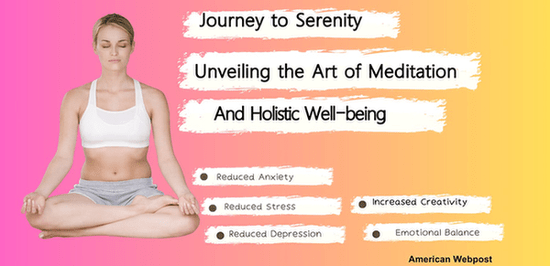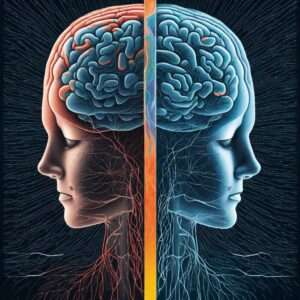Journey to Serenity: Unveiling the Art of Meditation and Holistic Well-being
Introduction
Journey to Serenity: Unveiling the Art of Meditation and Holistic Well-being
In today’s fast-paced and stress-laden world, achieving complete wellness has become an essential pursuit for many. One powerful tool that has stood the test of time in promoting holistic well-being is meditation. Its benefits extend beyond the physical realm, encompassing mental, emotional, and spiritual aspects of our being. But why is meditation crucial for achieving complete wellness? Let’s explore the mind-body connection and understand the profound impact of meditation on our overall well-being.

Meditation: Unraveling the Basics
What is meditation?
Meditation, derived from the Latin word “meditation,” meaning to ponder or contemplate, is a practice that involves training the mind to focus and redirect thoughts. Through various techniques, individuals can achieve a state of heightened awareness and inner peace.
Origins and Historical Significance
Meditation finds its roots in ancient civilizations, with evidence dating back to 5000 BCE. It has been an integral part of spiritual and religious traditions, such as Hinduism, Buddhism, and Taoism. Throughout history, meditation has been revered for its transformative and healing properties.
Different types of meditation practices
Meditation encompasses a wide range of practices, each offering a unique approach to cultivating mindfulness and achieving inner serenity. Some popular types include mindfulness meditation, visualization meditation, and loving-kindness meditation. Exploring these techniques allows individuals to find the meditation style that resonates most with them.
The Science Behind Meditation
Meditation is not just a mystical practice; it has been subject to scientific scrutiny, and the findings are remarkable.
Neurophysiological effects of meditation
Research has shown that meditation has a profound impact on the brain, leading to structural and functional changes. It activates the prefrontal cortex, the part of the brain responsible for executive functions like decision-making and emotional regulation. Moreover, regular meditation practice stimulates the release of endorphins, promoting a sense of calm and well-being.
Role of meditation in stress reduction
Stress has become an epidemic in modern society, leading to various physical and mental health issues. Fortunately, meditation has emerged as an effective antidote to stress. It reduces the levels of stress hormones like cortisol and activates the body’s relaxation response, promoting a state of deep relaxation.
Enhancing cognitive functions through meditation
Meditation has been found to enhance cognitive functions like attention, memory, and creativity. Studies have shown that regular meditation practice improves cognitive flexibility, allowing individuals to adapt to changing circumstances and think more creatively.
Preparing for a Successful Meditation Experience
To fully immerse oneself in the practice of meditation, it is essential to create a serene environment and embrace the right mindset.
Creating a serene meditation space at home
Designating a specific area in your home for meditation can enhance your practice’s effectiveness. Choose a quiet and clutter-free space, decorate it with soothing elements like candles or plants, and create a peaceful ambiance that promotes relaxation.
Essential tools and equipment for meditation
While meditation requires little in terms of physical tools, having a comfortable cushion or mat, known as a meditation seat, can significantly enhance your experience. Additionally, using props like bolsters and blankets can support proper posture and alleviate any discomfort during extended meditation sessions.
Developing the right mindset for meditation
Approaching meditation with an open and non-judgmental mindset is vital for reaping its full benefits. Let go of expectations and embrace the present moment with curiosity and acceptance. Trust the process and allow yourself to surrender to the meditation journey.
Techniques for Beginners: Exploring Meditation Practices
Meditation offers a rich tapestry of practices, making it accessible to individuals of all backgrounds and preferences. Here are three techniques that beginners can explore:
Mindfulness meditation: Cultivating present-moment awareness
Mindfulness meditation involves focusing the mind on the present moment, without judgment. It cultivates a heightened sense of awareness, allowing individuals to observe their thoughts, emotions, and bodily sensations without getting entangled in them.
Visualization meditation: Harnessing the power of imagination
Visualization meditation utilizes the power of imagination to evoke specific mental images or scenes. By immersing oneself in these visualizations, individuals can tap into their inner creativity, manifest their goals, and create a sense of peace and abundance.
Loving-kindness meditation: Nurturing compassion and empathy
Loving-kindness meditation involves directing feelings of love, compassion, and well-wishes towards oneself and others. By cultivating a sense of empathy and warmth, individuals can foster a deep connection with themselves and develop greater compassion for all living beings.
Navigating Common Challenges Faced by Beginners
Embarking on a meditation journey can sometimes be met with challenges. Here are some common obstacles faced by beginners and how to overcome them:
Dealing with restlessness and a wandering mind
Restlessness and a wandering mind are common hurdles during meditation. Instead of getting frustrated, view these distractions as opportunities for growth. Gently guide your focus back to the breath or chosen meditation object, and with time, the mind will become more settled.
Overcoming physical discomfort during meditation
Maintaining a comfortable posture can be challenging, especially during longer meditation sessions. Ensure proper alignment, use props like cushions or blankets to support your body, and take breaks when needed. Gradually, the body will become more accustomed to extended periods of sitting.
Addressing scepticism and misconceptions about meditation
Meditation may be met with scepticism, especially by those unfamiliar with its benefits. Educate yourself and others about the wealth of scientific evidence supporting the effectiveness of meditation. Share personal experiences and encourage others to approach meditation with an open mind.
Meditation and its Profound Impact on Mental Health
The benefits of meditation extend far beyond relaxation; it has the power to positively impact mental health in numerous ways.
Alleviating anxiety and reducing symptoms of depression
Anxiety and depression are prevalent mental health issues, affecting millions worldwide. Studies have shown that regular meditation practice can reduce anxiety and depressive symptoms significantly. By cultivating a calm mind and promoting self-compassion, individuals can experience relief from these debilitating conditions.
Increasing self-awareness and emotional well-being
Meditation heightens self-awareness, allowing individuals to observe their thoughts and emotions without judgment. Through this introspective practice, individuals can develop a deeper understanding of themselves and cultivate emotional well-being.
Combating insomnia and enhancing sleep quality
Sleep disturbances, including insomnia, have become increasingly common. Thankfully, meditation can help individuals achieve a restful night’s sleep. By calming the mind and promoting relaxation, meditation prepares the body for deep slumber.
Meditation for Physical Well-being
While meditation’s effects on mental health are well-established, it also offers numerous benefits for physical well-being.
Stress relief for optimal physiological health
Chronic stress wreaks havoc on the body, leading to various health issues. Regular meditation practice reduces stress levels, thereby promoting optimal physiological health. It helps balance hormone levels, boost immune function, and improve overall well-being.
Promoting heart health and reducing blood pressure
Cardiovascular diseases are a major concern globally. Meditation has been shown to contribute to heart health by reducing blood pressure and improving blood circulation. By alleviating stress and promoting relaxation, it creates an environment that supports a healthy heart.
Boosting the immune system and overall vitality
A robust immune system is essential for overall vitality and well-being. Meditation enhances immune function by reducing inflammation, bolstering cells’ ability to fight off pathogens, and promoting overall physical health.
Unleashing the Power of Meditation for Enhanced Focus and Productivity
In a world filled with distractions, meditation provides a sanctuary for sharpening focus and enhancing productivity.
Strengthening concentration and attention span
Meditation is a practice that trains the mind to sustain focus. By regularly engaging in meditation, individuals can strengthen their concentration and attention span, leading to heightened productivity in various aspects of life.
Uncluttering the mind for improved decision-making
A cluttered mind often leads to indecisiveness and poor judgment. Through meditation, individuals can learn to quiet the mind’s chatter, allowing for clearer thinking and more sound decision-making.
Cultivating a positive mindset for increased productivity
A positive mindset is a driving force behind productivity. Regular meditation practice helps cultivate a positive outlook, enabling individuals to approach challenges with resilience and creativity. By nurturing a positive mindset, productivity can soar to new heights.
Exploring the Spiritual Dimensions of Meditation
Beyond its physical and mental benefits, meditation offers a gateway to the spiritual realm.
Connecting with inner self and discovering purpose
Meditation allows individuals to embark on a profound inward journey, connecting with their innermost selves. Through this exploration, one can gain insights, find clarity, and discover their life’s purpose. It unveils the depths of the soul and creates a bridge between the physical and spiritual realms.
Cultivating gratitude and fostering a sense of fulfilment
Gratitude is a powerful force that can transform lives. Meditation nurtures a sense of gratitude by encouraging individuals to focus on the present moment and appreciate the abundance that surrounds them. By fostering gratitude, individuals can experience a profound sense of fulfilment.
Journey towards self-transcendence and self-realization
Meditation can be a vehicle for self-transcendence, allowing individuals to go beyond their limited self-identity. Through dedicated practice, one can experience moments of pure awareness and connection to something greater than oneself, leading to self-realization and a profound sense of oneness with the universe.
Meditation for Transformative Relationships
Meditation has the potential to reshape our relationships with others, fostering empathy, compassion, and harmonious connections.
Enhancing empathy and compassion towards others
Through meditation, individuals can develop a deep sense of empathy towards others. By cultivating a compassionate mindset, they can better understand others’ perspectives, relate to their experiences, and respond with kindness and understanding.
Developing healthier communication and connection
Communication is the cornerstone of any successful relationship. Regular meditation practice enhances mindfulness and awareness during interactions, promoting effective communication and fostering deeper connections with loved ones.
Cultivating harmonious relationships through meditation
Meditation provides an opportunity for introspection and self-reflection, enabling individuals to identify and work on their relational patterns. By cultivating awareness and compassion within themselves, they can create more harmonious and fulfilling relationships with others.
Meditation and Physical Exercise: A Perfect Synchronization
Combining meditation with physical exercise creates a synergy that benefits both the body and mind.
Complementary benefits of meditation and yoga
Yoga and meditation have a deep connection, with both practices originating from ancient traditions. Meditation complements yoga by providing a stillness and introspective element to the physical practice, allowing individuals to connect more deeply with themselves and harness the holistic benefits of yoga.
Mindful movement: Incorporating meditation into exercise routines
Engaging in physical exercise with mindful awareness elevates the experience to a whole new level. By incorporating meditation into exercise routines, individuals can enhance their mind-body connection, cultivate balance, and fully engage in the present moment.
Strengthening the mind-body connection for holistic fitness
The mind-body connection is a fundamental aspect of holistic fitness. Meditation deepens this connection, allowing individuals to listen to their bodies, respond to their needs, and attain optimal physical fitness. By strengthening the mind-body connection, individuals can experience holistic well-being.
Meditation Retreats and Centers Worldwide: Embarking on a Serene Exploration
For those seeking a deeper immersion into the world of meditation, retreats and centres offer a transformative experience.
Popular meditation retreat destinations
Meditation retreats can be found in various serene locations around the world. From the tranquil mountains of the Himalayas to the lush rainforests of Costa Rica, numerous destinations cater to individuals seeking a peaceful refuge to deepen their meditation practice.
Finding the right meditation centre for personal growth
When choosing a meditation centre, it is crucial to consider one’s personal preferences and goals. Research centres that align with your meditation style and offer comprehensive programs tailored to personal growth and development.
Immersing oneself in transformative meditation experiences
Meditation retreats provide an immersive environment for individuals to dive deeper into their practice. They offer guided meditations, classes, workshops, and opportunities for self-reflection. By immersing oneself in a retreat, individuals can experience profound transformation and gain valuable insights.
Incorporating Meditation into Daily Life
To truly harness the benefits of meditation, it is essential to integrate the practice into daily life.
Integrating meditation into morning and evening routines
Starting and ending the day with meditation sets the tone for a serene and purposeful day. Incorporating meditation into morning and evening routines allows individuals to cultivate mindfulness, establish a positive mindset, and experience a seamless transition between waking and resting states.
Mindfulness practices for everyday activities
Meditation doesn’t have to be limited to sitting in silence; it can be infused into everyday activities. Engaging in mindful eating, walking, or even working creates opportunities to bring present-moment awareness into every aspect of life.
Sustaining a consistent meditation practice over time
Consistency is key to reaping the long-term benefits of meditation. It is important to establish a realistic meditation routine and commit to it. Gradually increasing the duration and frequency of meditation sessions ensures that the practice becomes an integral part of one’s life.
Meditation and Children: Nurturing Minds for a Better Future
Teaching meditation to children equips them with lifelong tools for emotional resilience and well-being.
Teaching meditation techniques to children
Introducing meditation to children at an early age helps instil a habit of mindfulness and self-awareness. Tailoring meditation techniques to suit their age and interests, such as guided visualizations or breathing exercises, makes the practice accessible and engaging.
Benefits of meditation for child development
Meditation has numerous positive effects on child development. It enhances focus, concentration, and emotional regulation skills. By cultivating self-awareness and empathy, children can develop healthier relationships and navigate life’s challenges with greater ease.
Fostering emotional intelligence and resilience in children
Emotional intelligence and resilience are essential qualities for navigating life’s ups and downs. Meditation nurtures these traits by empowering children to recognize and regulate their emotions effectively. It equips them with the tools to cope with stress, build resilience, and flourish emotionally.
Meditation and Stress Management in the Workplace
Meditation programs in the corporate world are gaining momentum as employers recognize their potential to enhance employee well-being and productivity.
Introducing meditation programs to the corporate world
Forward-thinking organizations are embracing meditation programs as a means of supporting employee well-being. Offering meditation workshops, providing dedicated meditation spaces, and encouraging regular mindfulness
Read – 10 Surprising Ways Your Body and Mind Influence Each Other










